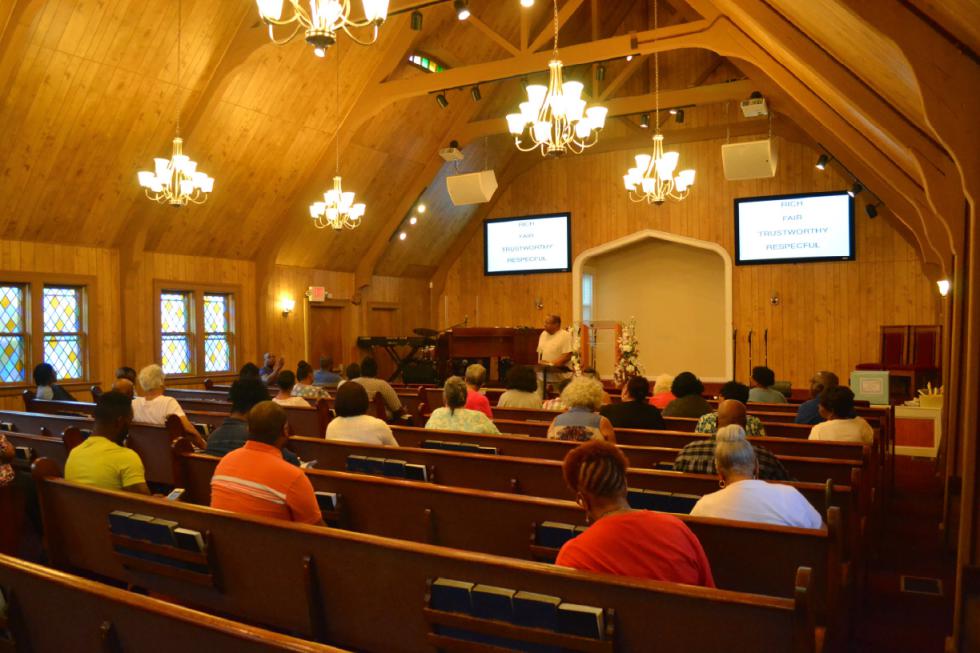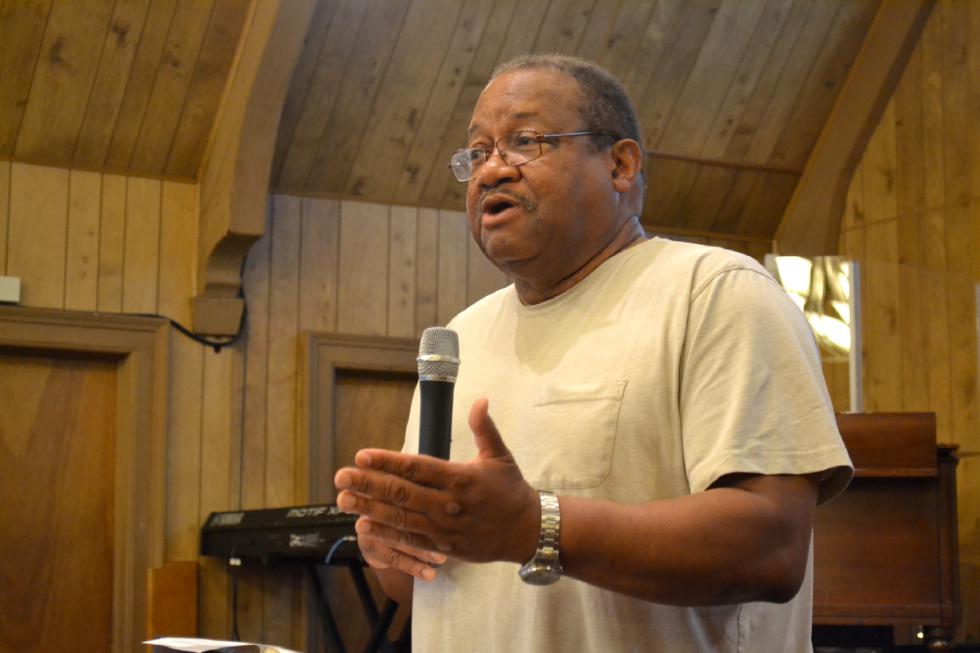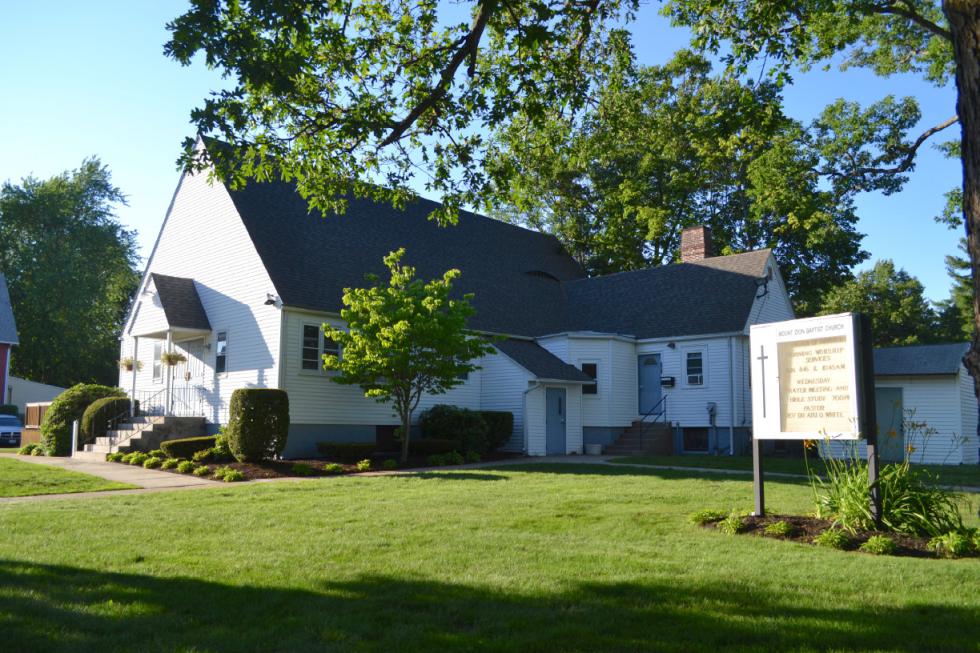A t the end of Bible study on Wednesday night, Steve Powell tells a joke.
“This guy is talking to God,” he says. “God says that in his eyes, a million years is like a minute, and a million dollars is like a penny. So the man says: well then, God, give me a penny!”
Powell scans the pews at Mt. Zion Baptist Church in Springfield, where about 40 of his fellow church members are gathered. “And God says: okay, then. Just a minute.”
The congregation laughs, and Powell smiles. “What I’m saying,” he adds, “is that God moves in his own time. What happened in Charleston — I just got to believe that God is going to use it for good. The Devil won’t win. The Devil won’t win.”
Powell leads a weekly midday Bible study session at Mt. Zion. Tonight they are discussing the book of Ruth — “a story of love,” as he describes it. But at black church gatherings this week, a story of hate also hangs in the air.
One week ago, on June 17, Dylann Roof, a 21-year-old South Carolina man with a legally acquired .45-caliber Glock handgun and a written manifesto condemning all people of color, allegedly shot nine parishioners dead at a Bible study session at the Emanuel AME Church in Charleston, South Carolina.
The act of terrorism has touched off national conversations about Roof’s psychology, his indoctrination into white supremacy, and the endlessly fraught racial history of the South. Many have called for the removal of the Confederate flag from the state house lawn in Charleston — although the flag still flew at full mast when the coffin carrying the body of slain senator Clementa Pickney arrived at the state house on June 23. Pickney served as pastor at the Emanuel church.
Mass shootings in America are on the rise. According to a Harvard School of Public Health report published in October, the rate has tripled since 2011, and mass shootings now occur roughly once every two months. But in the aftermath of the Charleston shooting, talk of gun control has been more closely woven with discussions of what W. E. B. DuBois called “the color line.” Those cultural and ideological divisions between race communities still run painfully deep.
Before Wednesday’s Bible study at Mt. Zion, Powell took a quiet moment to explain to me that the congregation has discussed the shooting several times in recent days, including at Sunday morning’s service with the church’s pastor, Dr. Atu White.
“This has been in everybody’s hearts,” said Powell, who has attended services at this church since it opened 38 years ago. “But in the Bible, there are many examples of God using bad events for good. I think some good will come of this somehow. We’re going to be prayerful, and things will get better.”
Powell grew up in North Carolina in the 1960s — a time when, as a high schooler, he said he was not allowed to swim at nearby Myrtle Beach because it was segregated. He said that in 2015 the country still has a lot of work to do to improve race relations and increase public safety.
Mt. Zion’s membership, which has recently surpassed 400 people, is predominantly African-American. And Powell said he feels that what happened in Charleston could have happened here in Springfield.
“It was an act of hate, which means it can happen anywhere,” he said. “But what are you going to do, hide out at home? You could get shot in your living room. So, I’m still coming to church. I’ve gotten no sense of fear from people here — that we will back away from what we believe.”
Churchmember Andrea Dixon said she was excited to see the Emanuel Church reopen its doors so quickly. “It lets people know that we’re not fearful,” she said. “We are not a fearful people.”
Dixon, 65, has attended Bible study at Mt. Zion for nearly 30 years, and she runs the weekly soup kitchen here. She described feeling “angry and disturbed” by the shooting, especially when her 10-year-old grandson saw a news report and asked her to explain it. She did her best to help him understand, but found it difficult.
“And a lot of people at church, they don’t want to talk about it at all,” she said. “Because we’re up here, not in the South, I think we’re blinded to it to a certain degree. But we’ve got to get past that narrow-minded thinking. Our roots are down there. Those are our people still.”
Her fellow churchmember Shirley Walker, 71, stressed the fact that racism is alive and well, and that nothing will get better until we conquer it. “You’ve just got to get to know people — really know them,” she said, explaining that she comes from a diverse family of black, Irish, Italian, and Hispanic relatives. “Our family makes it work. Why can’t the world get along like that?”
When asked whether the Charleston shooting encourages or dissuades her from coming to church, she looks puzzled by the question. “I’m more likely to come now than I ever was,” she said. “When something goes wrong, the place you want to be is at church.”
Mt. Zion may feel safe to its members, but Pastor Atu White still had a conversation with his staff about security this week. He’s mainly concerned, though, with comforting the congregation. “Then there’s another conversation on top of that,” he said, “which is how we as a society hold domestic terrorists accountable. Because black churches have been bombed and burned for hundreds of years in this country.”
White grew up in South Carolina. In 2000, he and a group of college friends marched to the state house in Charleston on a campaign to have the Confederate flag removed from the dome. This led to the flag’s relocation to the state house lawn. In many ways, he said, little of our rhetoric has changed since then.
“What really makes this a tragedy,” he said, “is that we’re not telling the full story of this man,” referring to Roof, the alleged gunman. “Where was he indoctrinated? Which hate groups are those, specifically? People are trying to make it seem like he’s a lone wolf who acted on his own. But it’s never that simple.”
On an emotional level, White said the past week has been “extremely difficult” for him. “One victim was 87 years old,” he said, referring to Emanuel parishioner Susie Jackson. “We have an 87 year old woman here who never misses Bible study. You start to see the reflection of those people in your own congregation, which makes this even more devastating and real.”
News of the Charleston shooting hit close to home for Bishop Bryant Robinson as well. Robinson serves as pastor at Macedonia Church of God in Christ in Springfield, which was burned to the ground immediately following the 2008 presidential election by three white men since convicted of arson. The church reopened in 2011.
“We empathize very much with what they are dealing with,” Robinson said. “But I think they understand that God has a way of healing.”
The shooting is an example, Robinson said, of the vestiges of 400 years of American slavery, Jim Crow laws, segregation, and discrimination. “The burning of Macedonia was another example. Our education, our economy, and even our theologies are still compromised by the legacy of those dark days.”
Recent decades have brought progress in racial understanding, he added, “but we still have miles to go. Not only in how we relate to each other, but in our individual fixations on violence, fear, and greed. America has to come to grips with that.”
Samuel Saylor, the pastor at Gardner Memorial AME Zion Church in Springfield, said he spoke about Charleston on Sunday to his congregation of roughly 35 people. He agreed that black churches need to be protected and feel safe. “But how do you do that?” he said. “Do you install metal detectors, put an armed guard at the door? Is that really what Christ would have us do — go get our swords? What about living through love and sacrifice, and being your neighbor’s best friend? Those remedies can effect more change than a guard standing at the door with a gun.”
Saylor has advocated extensively for fewer guns in recent years. In 2012, his 20-year-old son Shane was shot and killed in Hartford. Saylor lived in Hartford at that time, and he became involved with several social justice ministries there, which held vigils at crime sites and offered counsel to grieving community members.
Each year, national homicide rates involving firearms dwarf the death tolls from mass shootings, but the mass shootings draw the majority of media coverage, Saylor said. After the December 2012 massacre at Sandy Hook Elementary School in Newtown, Conn., in which 20 children and six adults were killed, Saylor remembered black preachers in Hartford holding fundraisers and vigils. “But they have never held a vigil or a fundraiser for the fallen in their own city,” he said. “I am amazed by that.”
He explained why this is. “Legions of folks die from urban violence each day, but you don’t notice it, because it happens in little drips,” he said. “You don’t think about the single drips of water. You think about the splash.”
His advice to people interested in making a change is simple: “Get involved, and make a commitment. Don’t pray and move on.”•
Contact Hunter Styles at hstyles@valleyadvocate.com





